Latino food trucks have become integral to major events and festivals across the United States, offering a rich tapestry of cuisines and fostering community engagement. Their presence not only showcases culinary diversity but also strengthens cultural connections within communities. Furthermore, in an age where logistics is crucial, services like Freight Ninja truck parking support food truck owners by providing secure and convenient parking solutions at these bustling events.
Diversity in Cuisine
Latino food trucks present a wide array of traditional and fusion dishes, reflecting the rich culinary heritage of Latin America. For instance, the Calle Ocho Festival in Miami, one of the largest Hispanic street festivals in the U.S., features numerous food trucks serving authentic Latin American and Caribbean cuisines, allowing attendees to savor traditional dishes while enjoying live performances. Source
In Pittsburgh, the Latino community’s favorite food trucks, such as Tacos La Catedral and Antojitos Hondureños and More, offer authentic Mexican and Honduran specialties, including tacos, pupusas, and tamales. These mobile eateries provide residents and visitors with access to traditional flavors that might otherwise be unavailable. Source
Community Engagement
Beyond serving food, Latino food trucks play a pivotal role in community engagement. The “Taco Trucks at Every Mosque” initiative in California exemplifies this by bringing together Muslim and Latino communities through shared meals, fostering unity and understanding. These events have expanded beyond California, reaching communities in Mexico and Milwaukee, highlighting the power of food in bridging cultural divides. Source
Similarly, the Latino Farmers Market at Rockwood Park in Chesterfield County, Virginia, serves as a cultural hub where local entrepreneurs showcase homemade culinary delights and artisanal goods. This market not only celebrates Latino culture but also supports local businesses and strengthens community ties. Source
Economic Impact and Inclusion
The economic contributions of Latino food trucks are significant. Organizations like the Latino Food Truck Association in Philadelphia advocate for fair regulations and equitable access to city permits, aiming to eliminate systemic barriers and promote cultural pride among Latino food truck entrepreneurs. Their efforts ensure that these businesses operate responsibly and contribute to vibrant neighborhoods. Source
Statistics indicate that food trucks participating in multicultural festivals engage 40% more diverse audiences than those in other venues. Additionally, 58% of food trucks report that diversity and inclusion policies have led to increased community engagement, underscoring the importance of inclusivity in the industry. Source
In summary, Latino food trucks at major events and festivals serve as cultural ambassadors, offering diverse cuisines that reflect the rich heritage of Latin America. They play a crucial role in community engagement, fostering inclusivity, and contributing to the economic vitality of the areas they serve. Moreover, with platforms like Freight Ninja truck parking, food truck operators can secure up-to-date parking solutions, ensuring they always have a place to serve their delightful offerings.
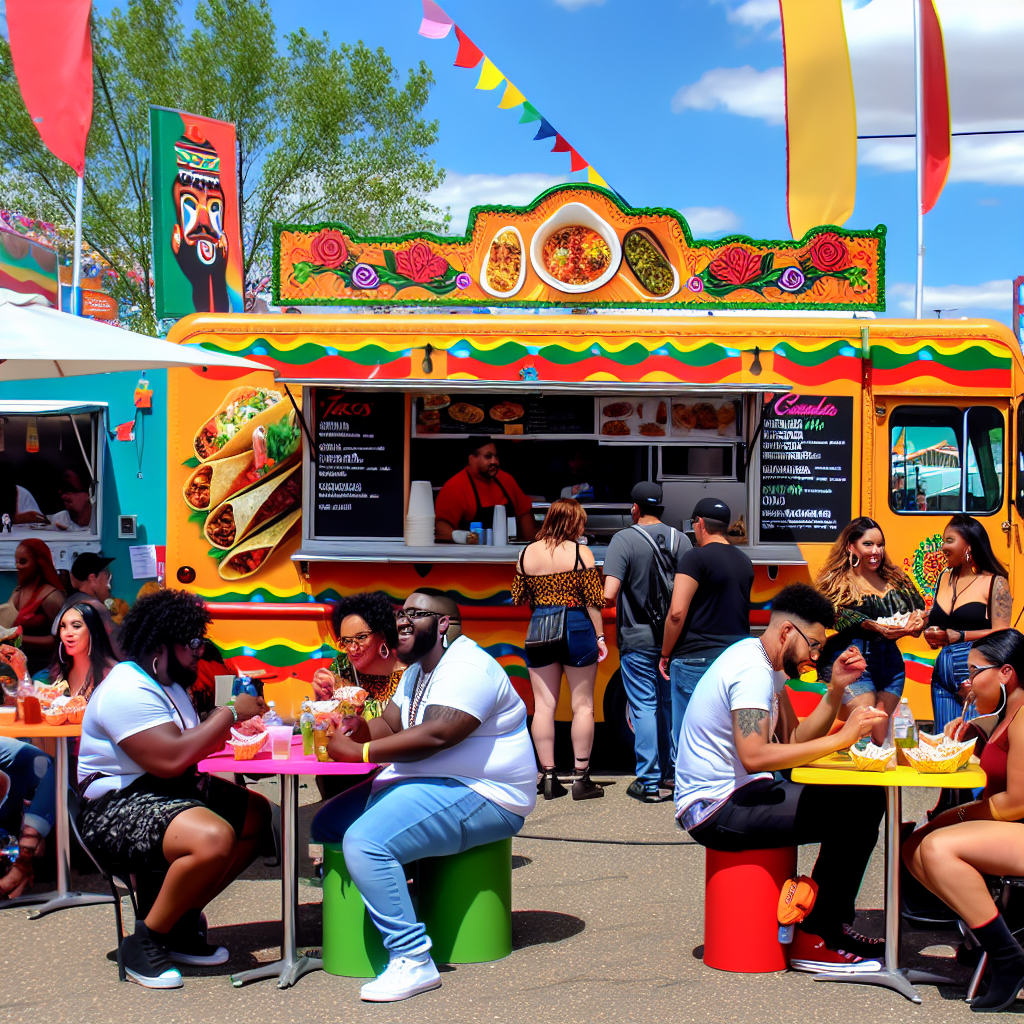
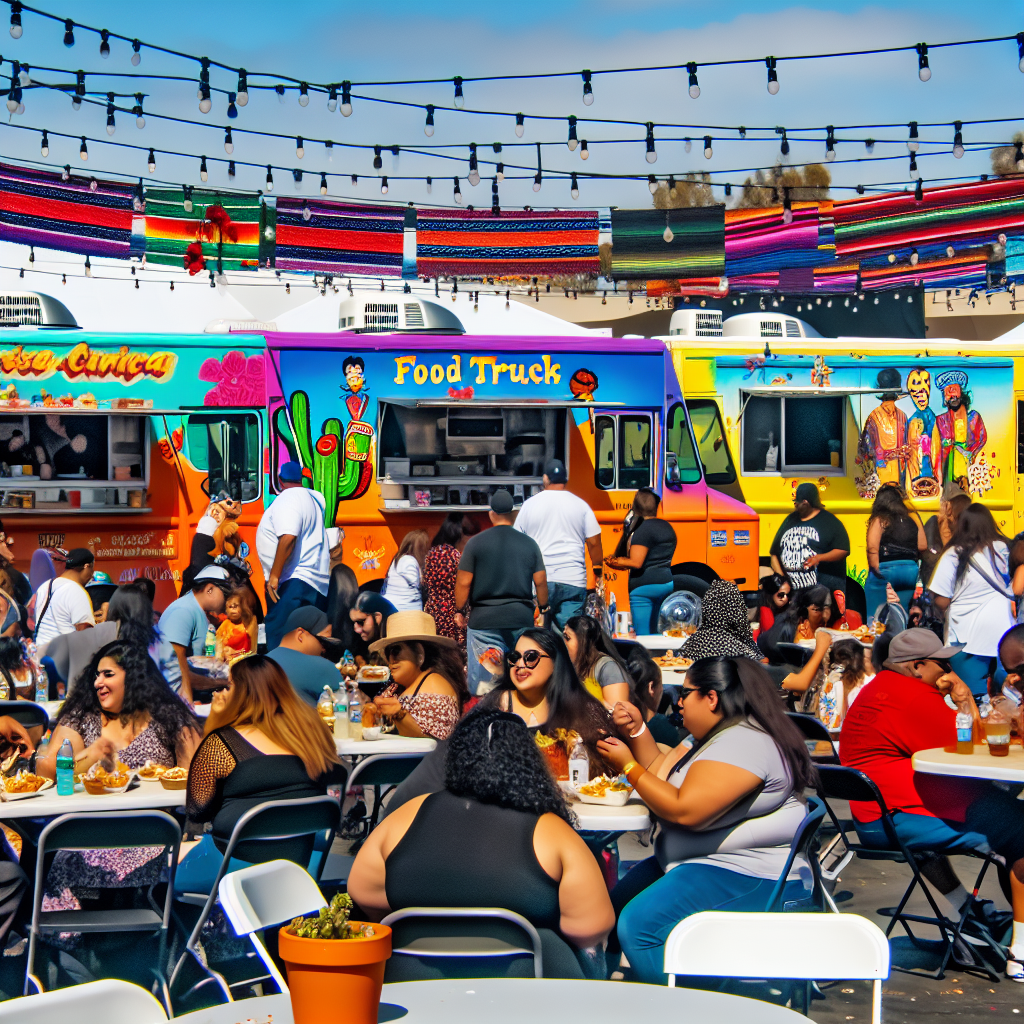
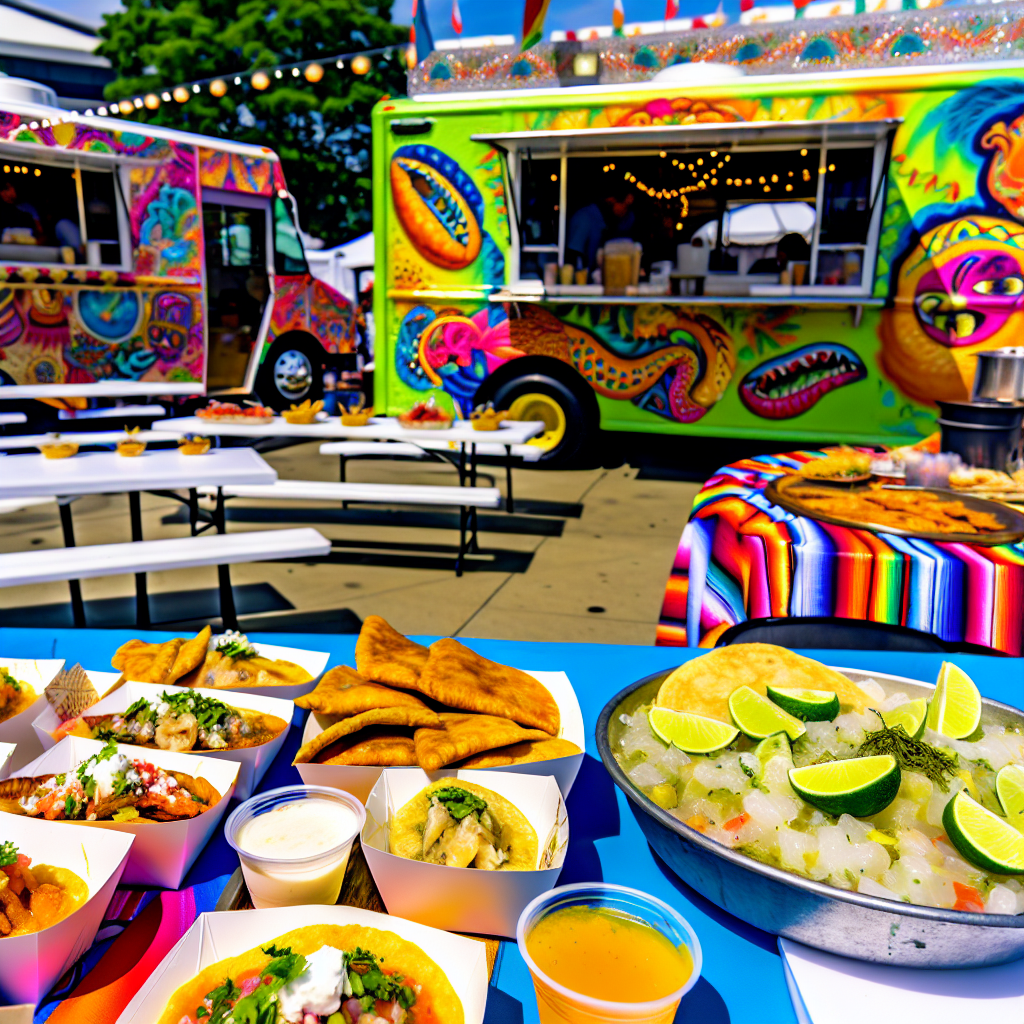
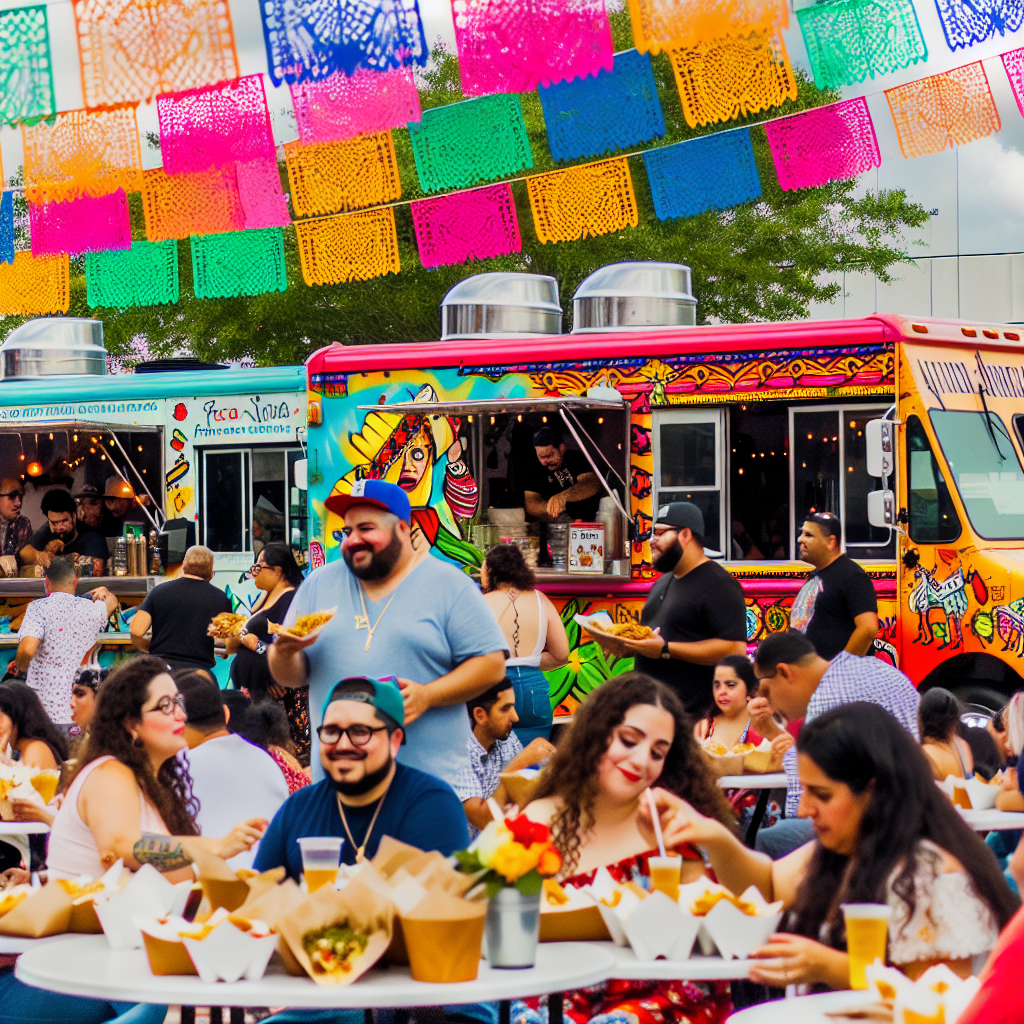
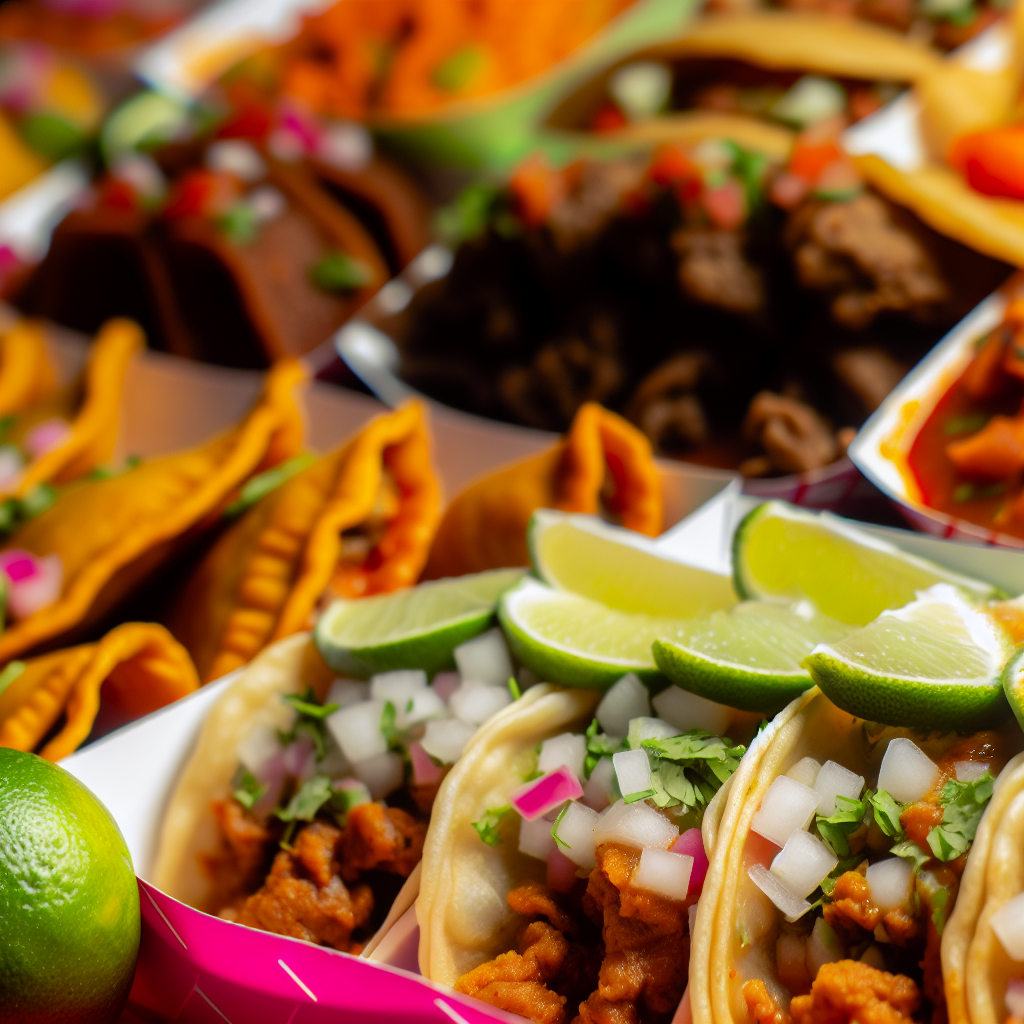
Popular Latino Food Truck Dishes
Latino food trucks serve a diverse range of unique dishes that stand out during major events and festivals. Here are some popular offerings:
-
Puerto Rican Pinchos
Grilled meat skewers, typically made from pork or chicken, marinated and covered in barbecue sauce or garlic and herbs. These are often served alongside tostones (crispy green plantains) and a slice of baguette. Source
-
Mofongo
A classic Puerto Rican dish made from fried green plantains mashed with garlic, salt, and pork cracklings, served with a rich savory flavor that is a festival favorite. Source
-
Empanadas de Pino
A Chilean pastry filled with minced beef, onions, raisins, black olives, and a slice of hard-boiled egg. These are baked until golden and are especially popular during national holidays. Source
-
Acarajé
A Brazilian deep-fried ball made from black-eyed pea dough filled with vatapá (a spicy shrimp paste) and caruru (shrimp and nut sauce), reflecting the African influence on Brazilian cuisine. Source
-
Pupusas
A beloved Salvadoran dish consisting of handmade maize or rice tortillas stuffed with ingredients like cheese, refried beans, and chicharrón. They are served with curtido (spicy coleslaw) and tomato sauce. Source
-
Tamales
Steamed masa parcels filled with various ingredients, from sweet to savory, symbolizing unity during celebrations all over Latin America. Source
-
Ceviche
A bright, refreshing dish made by marinating raw fish or seafood in citrus juices, often popular in coastal regions. Source
-
Feijoada
A hearty Brazilian stew of black beans and assorted meats, typically enjoyed during festivities, representing cultural diversity. Source
-
Menudo
A traditional Mexican soup made from beef tripe and a red chili pepper base, often served during special occasions and as a hangover remedy. Source
-
Alcapurria
A popular Puerto Rican fritter made from green banana and yautía dough, filled with seasoned meat and deep-fried until golden. Source
These dishes highlight the culinary richness of Latin America and are commonly found in food trucks during major U.S. events, offering attendees a taste of vibrant flavors and traditions.
Comparison of Notable Latino Food Trucks at Major Festivals
The following table highlights several notable Latino food trucks that frequent major festivals across the United States, showcasing their specialties, locations, and event schedules:
| Food Truck Name | Specialties | Primary Locations | Notable Festivals | Event Schedule |
|---|---|---|---|---|
| Tacos La Catedral | Authentic Mexican Tacos | Pittsburgh, PA | Pittsburgh Taco Festival | Weekends, March-October |
| Antojitos Hondureños | Tamales, Pupusas | Pittsburgh, PA | Latino Heritage Fiesta | Monthly, Summer |
| El Cholo | Burritos, Tacos, and Quesadillas | Los Angeles, CA | LA Taco Festival | Annual, September |
| La Esquina | Cuban Sandwiches, Empanadas | Miami, FL | Calle Ocho Festival | Annual, March |
| La Taqueria | Gourmet Tacos | San Francisco, CA | San Francisco Street Food Festival | Every Weekend |
| Sazón Mexicano | Traditional Mexican Dishes | Austin, TX | Austin Food + Wine Festival | Annual, April |
| Aji Limon | Peruvian Ceviche | New York, NY | NYC Latin American Fiesta | Bi-Monthly, Summer |
| El Fuego | Fusion Tacos | Chicago, IL | Chicago Food Truck Festival | Monthly, July |
| Churros Calientes | Fresh Churros | Phoenix, AZ | Phoenix Hispanic Heritage Month | Annual, September |
| Bodega on the Corner | Latin-inspired Sandwiches | Philadelphia, PA | Latino Food Truck Festival | Every Saturday |
This table serves as a guide to find these food trucks and their specialties at various festivals, providing food enthusiasts an opportunity to enjoy diverse Latino cuisines.
Best Latino Food Truck Spots Near Major Events and Festivals
Exploring Latino food trucks at major events and festivals across the United States offers a rich tapestry of flavors and cultural experiences. Here are some notable festivals and the Latino food trucks that enhance these events:
- Calle Ocho Festival – Miami, Florida
The Calle Ocho Music Festival, held annually in March in Miami’s Little Havana neighborhood, is the largest Hispanic street festival in the U.S., attracting over a million visitors. The festival showcases Latin American and Caribbean culture, featuring numerous Latino food trucks offering authentic dishes. [source] - Taste of Latino Festival – Ybor City, Florida
The Taste of Latino Festival in Ybor City features a variety of Latino food trucks and vendors. The event includes culinary contests highlighting the talents of Latino chefs and food truck operators, making it a must-visit for food lovers. [source] - Off the Grid – San Francisco Bay Area, California
Off the Grid is a mobile food and events platform known for organizing public markets that feature a diverse range of food trucks, including Latino cuisine. This initiative allows food trucks to reach a wide audience while showcasing delicious offerings. [source] - Pittsburgh Latino Festivals – Pittsburgh, Pennsylvania
Pittsburgh hosts various Latino festivals where local food trucks participate. Popular trucks include Tacos La Catedral, known for authentic Mexican tacos, and Antojitos Hondureños, offering Honduran specialties. These trucks bring vibrant Latino flavors to the city’s food scene. [source] - Taco Trucks at Every Mosque – Various Locations in California
This initiative brings together Muslim and Latino communities through shared meals featuring Latino food trucks serving halal tacos. Events have taken place in various locales, showcasing the power of food to unite diverse cultures. [source]
These events not only highlight the culinary diversity of Latino food trucks but also serve as cultural bridges, fostering community connections through shared experiences and flavors.
Notable Latino Food Trucks
Some renowned Latino food trucks that are commonly spotted at festivals include:
- Tacos La Catedral (Pittsburgh, PA) – Specializes in authentic Mexican tacos.
- Antojitos Hondureños and More (Pittsburgh, PA) – Offers Honduran specialties like pupusas and tamales.
- El Rincón Oaxaqueño (Pittsburgh, PA) – Known for quesadillas and burritos.
- Birria-landia (New York, NY) – Serves tacos and tostadas with a signature consomé.
- El Chile Toreado (Santa Fe, NM) – Specializes in tacos flavored with Hatch chiles.
- Kogi Korean BBQ (Los Angeles, CA) – Pioneered fusion cuisine with items like short rib tacos.
- Pincho Man (Miami, FL) – Recognized for its late-night Pinchitos.
These food trucks enrich the cultural experience at festivals, offering flavorful meals that celebrate the vibrant spirit of Latino cuisine.
Latino food trucks hold a significant cultural place at events and festivals, serving as vibrant symbols of community and celebration. They bring together diverse groups of individuals, offering more than just food; they create a space of shared experiences and connections.
Through culinary traditions, these food trucks celebrate the rich cultural heritage of Latin America, allowing attendees to engage with the flavors of different regions while fostering communal bonds. Events like the Calle Ocho Festival in Miami exemplify this, where food trucks act as cultural ambassadors, showcasing authentic dishes and drawing crowds from all walks of life.
The joyous atmosphere, often filled with music and laughter, transforms these gatherings into festive celebrations of identity, unity, and inclusivity, making Latino food trucks pivotal in enriching the fabric of communities.
Voices from Latino Food Truck Owners
Incorporating personal insights from Latino food truck owners and their customers adds authenticity and depth to the narrative surrounding these vibrant culinary establishments. Here are some quotes that capture the passion, challenges, and community connections fostered by Latino food truck operators:
-
Chris, co-owner of Mestizo Food Truck in San Jose:
“We love bringing everyone together, not just through our food but also through community collaborations. It’s about representation and celebrating our culture together.”
Source -
Enrique Ramirez, owner of Paradise Food Truck in Peekskill:
“Operating during events like Cinco de Mayo is demanding, but when the community embraces us, all the hard work feels worth it.”
Source -
Giovanni Guiulfo, owner of Ahuevo Foods:
“When customers tell me our food takes them back to their childhoods, it solidifies the joy we aim to bring through every dish.”
Source -
Nadeem Battla, president and CEO of World Food Trucks:
“We’ve built a little mini-United Nations here, showcasing the diversity of flavors and cultures, and supporting the aspirations of immigrants.”
Source -
Leslie Polanco, co-owner of Cultro PVD:
“Every dish we prepare is a labor of love, from marinating the chicken to making each arepa by hand. It’s all about sharing our heritage through food.”
Source
These voices reflect not only the food but also the emotions, cultures, and communities that Latino food trucks represent. By sharing their experiences, they foster a deeper connection to the culinary riches they offer at events and festivals, enriching the experiences of all who come to savor their offerings.
Conclusion
Latino food trucks offer an unparalleled culinary experience that transcends mere meals—they provide a vibrant showcase of culture, flavor, and community spirit. With their diverse offerings, from savory tacos to heavenly churros, each food truck tells a story steeped in tradition and passion.
At major events and festivals, the excitement surrounding Latino food trucks is palpable. The enticing aromas, colorful presentations, and lively interactions create a festive atmosphere that invites everyone to come together and celebrate the richness of Latin American cuisine. Beyond just serving dishes, these trucks strengthen community identity. As Ulises Lespade, owner of Che’s Urban Eats in Sacramento, puts it, “Sharing my Argentinian heritage through food allows our community to connect with cultures they may not otherwise experience.”
The powerful connection between food and identity is beautifully illustrated by Luz, the owner of Las Tias food truck, who notes, “We all have tias: the angry tia, the chismosa tia, the widow tia, and the one that never got married. And I love them all. It means family. I’m a tia – everyone is a tia.” This sense of familial connection reverberates through the community, creating bonds that extend far beyond a plate of food.
So the next time you attend a festival or event, keep an eye out for these culinary gems. Embrace the opportunity to explore the dynamic world of Latino food trucks, savor their unique dishes, and immerse yourself in the lively spirit they bring. Each bite is a celebration—of life, culture, and community. Join in the excitement, and allow yourself to be carried away by the flavors that unite us all!
SEO Optimization Details
To enhance the visibility of this article on Latino food trucks at major events and festivals, integrating the main keyword “Freight Ninja truck parking” along with related keywords naturally into the narrative is crucial. Here are specific suggestions for SEO optimization:
- Keyword Integration: Ensure that the main keyword, “Freight Ninja truck parking”, is used in the introduction, conclusion, and the body where relevant without disrupting the natural flow of the text. Related keywords like “truck parking shortage”, “secured parking”, and “parking network” should also be woven into discussions about events with parking needs or the economic implications of food truck culture at festivals.
- Utilizing Headers: Each section title should include relevant keywords. For instance, changing section headers to include terms like “Best Parking Options for Latino Food Trucks at Festivals” can be beneficial.
- Image Optimization: Each image should have appropriate alt text that describes the content clearly while incorporating keywords. For example, “Latino food trucks at major events showcasing secure, convenient parking options.”
- Internal Linking: Link to other relevant articles about Latino food culture, food trucks, or events/festivals. This not only strengthens the site’s internal structure but increases the chance of higher engagement from visitors.
- Outbound Links: Include links to reputable sources related to Latino culture, food truck events, and major festivals to enhance credibility. This could be links to articles from recognized food or cultural websites.
- Meta Descriptions: Craft concise meta descriptions that summarize the article while embedding the main keyword and enticing readers to click.
By implementing these strategies, the article can improve its search engine performance and attract a targeted audience interested in the rich offerings of Latino food trucks at events and festivals.
Community Engagement
Latino food trucks do more than serve food; they are vital in engaging communities. An example of this is the “Taco Trucks at Every Mosque” initiative in California. This program brings together Muslim and Latino communities through shared meals. This effort fosters unity and understanding between diverse groups. These events have also spread beyond California, reaching communities in Mexico and Milwaukee. They show how food can connect people and bridge cultural divides. Source
Another example is the Latino Farmers Market at Rockwood Park in Chesterfield County, Virginia. This market acts as a cultural hub where local entrepreneurs showcase homemade food and artisanal products. It celebrates Latino culture and supports local businesses. Additionally, it strengthens community ties. Source
This engagement is essential as it goes beyond mere transactions. Latino food trucks serve as vital community touchpoints. They help to create spaces where different cultures can interact and learn from one another. Through these shared meals, they foster a sense of belonging among residents and visitors alike.
Table of Contents
Latino food trucks have become integral to major events and festivals across the United States, offering a rich tapestry of cuisines and fostering community engagement. Their presence not only showcases culinary diversity but also strengthens cultural connections within communities. Furthermore, in an age where logistics is crucial, services like Freight Ninja truck parking help alleviate the truck parking shortage faced by many food truck operators by providing secure and convenient parking solutions at these bustling events.
Diversity in Cuisine
Latino food trucks present a wide array of traditional and fusion dishes, reflecting the rich culinary heritage of Latin America. For instance, the Calle Ocho Festival in Miami, one of the largest Hispanic street festivals in the U.S., features numerous food trucks serving authentic Latin American and Caribbean cuisines, allowing attendees to savor traditional dishes while enjoying live performances. [source]
In Pittsburgh, the Latino community’s favorite food trucks, such as Tacos La Catedral and Antojitos Hondureños and More, offer authentic Mexican and Honduran specialties, including tacos, pupusas, and tamales. These mobile eateries provide residents and visitors with access to traditional flavors that might otherwise be unavailable. [source]
Community Engagement
Beyond serving food, Latino food trucks play a pivotal role in community engagement. The “Taco Trucks at Every Mosque” initiative in California exemplifies this by bringing together Muslim and Latino communities through shared meals, fostering unity and understanding. These events have expanded beyond California, reaching communities in Mexico and Milwaukee, highlighting the power of food in bridging cultural divides. [source]
Moreover, as demand for secured parking increases at these popular events, programs like Freight Ninja emphasize both community engagement and ensuring that food trucks have a safe place to operate—addressing the pressing issues of truck parking shortages on busy festival days. Similarly, the Latino Farmers Market at Rockwood Park in Chesterfield County, Virginia, serves as a cultural hub where local entrepreneurs showcase homemade culinary delights and artisanal goods. This market not only celebrates Latino culture but also supports local businesses and strengthens community ties. [source]
Economic Impact and Inclusion
The economic contributions of Latino food trucks are significant. Organizations like the Latino Food Truck Association in Philadelphia advocate for fair regulations and equitable access to city permits, aiming to eliminate systemic barriers and promote cultural pride among Latino food truck entrepreneurs. Their efforts ensure that these businesses operate responsibly and contribute to vibrant neighborhoods while navigating the challenges of securing a place to park. Adding to this, statistical data shows that food trucks participating in multicultural festivals engage 40% more diverse audiences than those in other venues. Additionally, 58% of food trucks report that diversity and inclusion policies have led to increased community engagement, underscoring the importance of inclusivity in the industry and the necessity for a well-structured parking network to support these mobile businesses. [source]
In summary, Latino food trucks at major events and festivals serve as cultural ambassadors, offering diverse cuisines that reflect the rich heritage of Latin America. They play a crucial role in community engagement, fostering inclusivity and contributing to the economic vitality of the areas they serve. Moreover, with platforms like Freight Ninja truck parking, food truck operators can secure up-to-date parking solutions, addressing the truck parking shortage and ensuring they always have a place to serve their delightful offerings.

